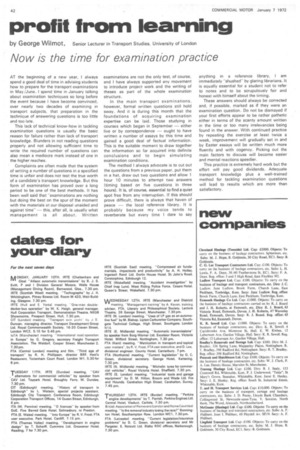profit from learning
Page 40

If you've noticed an error in this article please click here to report it so we can fix it.
by George Wilmot, Senior Lecturer in Transport Studies, University of London
Now is the time for examination practice
AT the beginning of a new year, I always spend a good deal of time in advising students how to prepare for the transport examinations in May /June. I spend time in January talking about examination techniques so long before the event because I have become convinced, over nearly two decades of examining in transport subjects, that preparation in the technique of answering questions is too little and too late.
This lack of technical know-how in tackling examination questions is usually the basic reason for failure rather than lack of transport knowledge. Blunders in not reading questions properly and not allowing sufficient time to write the required number of questions can also mean a mediocre mark instead of one in the higher reaches.
Complaints are often made that the system of writing a number of questions in a specified time is unfair and does not test the true worth of a candidate's transport knowledge. But this form of examination has proved over a long period to be one of the best methods. It has been well said that "examinations are nothing but doing the best on the spur of the moment with the materials at our disposal unaided and against time" this, after all, is usually what management is all about. Written
examinations are not the only test, of course, and I have always supported any movement to introduce project work and the writing of theses as part of the whole examination structure.
In the main transport examinations, however, formal written questions still hold sway. And it is during this month that the foundations of acquiring examination expertise can be laid. Those studying in courses which began in September either live or by correspondence ought to have written a number of essays by this time and gained a good deal of factual information. This is the suitable moment to draw together the information so far acquired into definite conclusions and to begin simulating examination conditions.
The method I always advocate is to cut out the questions from a previous paper, put them in a hat, draw out two questions and allow 1 hour 10 minutes to attempt two answers (timing based on five questions in three hours). It is, of course, essential to find a quiet spot free from any interruption. If this should prove difficult, there is always that haven of peace the local reference library. It is probably because my voice tends to reverberate but every time I dare to say anything in a reference library, I am immediately "shushed" by glaring librarians. It is equally essential for a student not to refer to notes and to be scrupulously fair and honest with himself about the timing.
These answers should always be corrected and, if possible, marked as if they were an examination question. Do not be dismayed if your first efforts appear to be rather pathetic either in terms of the scanty amount written in the time or too many irrelevancies being found in the answer. With continued practice by repeating the exercise at least twice a week, improvement will gradually set in and by Easter essays will be written much more fluently and with cogency. Picking out the main factors to discuss will become easier and mental reactions speedier.
This practice is extremely hard work but the effort will pay good dividends. Adequate transport knowledge plus a well-trained method for tackling examination questions will lead to results which are more than satisfactory.




















































































